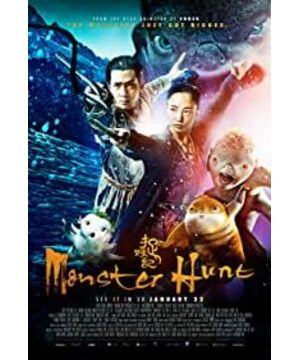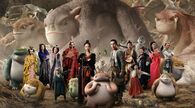Facing the achievement of "Monster Hunt", there was thunderous applause inside and outside the Chinese film industry, and everyone raised their arms and shouted that Chinese blockbusters have ushered in the 2.0 era! This is a new era in which Chinese stories are told in Chinese and the Chinese people realize the Chinese dream. In this new era, Hollywood blockbusters are no longer a market myth of "respecting the mountains", and Chinese films can no longer rely on "small and broad-minded". "The success in terms of cost-effectiveness is finally achieved with high input, high output, meticulous work, and generous efforts in front of American blockbusters!
But this increasingly active and boiling movie market looks like a pot of good soup, but it is actually a pot of hot oil. As the saying goes, some people are happy and others are worried. When "new directors" with new ideas and new thinking celebrate the enthusiasm of the audience, let's not forget the heavy sighs behind the sun: "Ramping Hollywood" makes the audience feel the love of popular artists. The aesthetic judgment is shocking; "Taoist Down the Mountain" makes the audience sigh that the "overlord" is old; "Fate" makes people feel the loneliness of Feng's comedy; "Gardenia Blossoms" makes all adults worry about the face of Chinese movies... ... In today's Chinese movie box office rankings are worth one billion heroes, many big names have something to say about the bursting market and the chaotic film industry.
Xu Chengyi said: "What I did in the United States before may not necessarily be used in "Monster Hunt", and it is a different culture. Many times I have to remind myself that this is for the Chinese people, so many It's all shot from a Chinese perspective."
Chinese audiences are a very unique group of audiences. Their main body is young and has limited social experience. While they are anxious about real life, they also have unrealistic yearning for the money-loving fans. They love nostalgia, and each generation believes that they have the most The humiliated present and the purest youth; they are keen on fantasy, they like soft and cute, addicted to chicken soup, they are eager to restore an unattainable reality in the dream of the movie; they are cautious, conservative, and wait-and-see for creativity. Images and familiar stories will give them a greater sense of security, which in turn makes them brave enough to pay for the box office; they need to experience the beauty of life in consumption and watching other people's consumption, which is their usual means to relieve the pressure of life; they lack basic basic Film knowledge, humanistic quality and even cultural level, they expect the most direct entertainment and the most intuitive stimulation...
Such a special audience has created a very special kind of film - Chinese film, rather than calling it a film, it is better to call it " Chinese Screen Entertainment". The expression of the film, the obedience of the film, the grammar of the film and even the culture inherited from the film rarely exist on the Chinese screen, because the Chinese audience lacks the ability to understand the picture, and the Chinese audience prefers to listen to the story. Perhaps this is due to cultural traditions. Western audiences like to "watch dramas", but Chinese audiences are used to "listening to dramas". Compared with art appreciation, the current Chinese audience needs more public opinion. So what's outside the screen becomes the main factor that determines whether the audience enters the movie theater. The mentality of watching stars is universal, but Chinese people like to watch everything related to stars.
Therefore, Professor Dai Jinhua of Peking University said: "Artistic film directors are more and more careful to show love to the audience with an attitude of courting them. Our directors lack the humility of courtship, and must face the audience instead of the market." What it calls for is the value of excess capital, and the comfort that film can bring to the audience as an art form rather than a commodity. But there is a small paradox behind this razor-sharp point of view - how to distinguish between facing the audience and facing the market? Doesn't the market represent precisely the audience?
Like many problems in China, Chinese film is caught in a dilemma, a dilemma between an idealistic cultural obsession and a development concept that is driven by greed and "money". The Chinese are so hungry for wealth, and this desire is so strong that the Chinese themselves are terrified, so I have to jump out from time to time to "wake up" - have I lost something more important in the pursuit of wealth? The dual nature of the film exacerbates this dilemma. But fortunately, the composition of Chinese filmmakers is very complex, and their individual extremes form a kind of group inclusiveness. This inclusivity has spawned a pragmatic win-win situation similar to the law of biological population continuation: you are your "Little Times", I will be my "The Return of the Great Sage"; "Pancake Man" tells inspirational stories in the way of modern storytelling , although the image quality is not up to the mark, the grass-roots spirit can still win the whole house; "Monster Hunt" uses Hollywood's narrative structure and Hollywood's image level to outline a Chinese "evil" world that is very similar to "Transformers", although The character design that resembles Shrek does not seem to be very thoughtful...
Chinese movies are in a stage of collective trial and error, and the bottom line can only be formed by constantly breaking through the bottom line. The most important thing at this stage is not to be impatient, not to be discouraged, to encourage more attempts and less to shoot. Only by allowing more possibilities to grow, can Chinese films have a broader future. We must respect the audience, but do not surrender to the market. As the People's Daily said, we must believe in the power of a standing ovation.
(It has been published in the Beijing Times, and may not be reproduced without permission)
View more about Monster Hunt reviews











